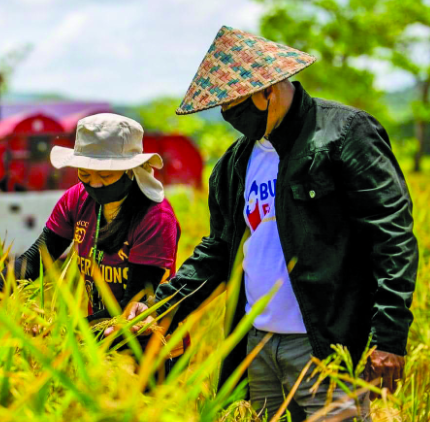ITC’s Alliances for Action agribusiness team went to Rome, Italy, to showcase its sustainable food system programmes at the UN Food Systems Summit+2 Stocktaking Moment held at FAO headquarters.
They join people from across the world to explore how to transform agrifood systems. These include the impacts of conflicts and climate change as well as access to finance and other resources.
The UN Food Systems Summit+2 Stocktaking Moment (UNFSS+2 STM) – held from 24-26 July 2023 at the UN Food and Agriculture Organization (FAO) – serves as the first global follow-up to the 2021 Food Systems Summit.
Over 2,000 participants are attending from 161 countries, including 22 Heads of State/Governments and more than 100 Ministerial delegates, over 150 Non-State-Actor organizations, as well as the UN System and other international organizations.
ITC’s Alliances for Action is exhibiting at the event to showcase innovative partnerships on food systems transformation and trade. Their booth in the FAO atriumpresents its partnerships, approach and targeted activities for sustainable food systems that seek to add value at origin and strengthen small farmers and processors.
Up to 783 million people are facing hunger in the world, a number that has drastically increased under the effects of the pandemic and repeated climate shocks and conflicts, according to the latest State of Food Security and Nutrition in the World report.
The ethos of the ITC sustainable agribusiness initiative aligns with the event’s call for ‘urgent action at scale, building on the latest evidence that sustainable food systems contribute to better and more sustainable outcomes for people, planet, and prosperity leaving no one behind.’
Showcasing partnerships green and blue food systems in the Caribbean
‘3.1 billion people cannot afford a healthy diet,’ said FAO Deputy Director-General Maria Helena Semedo. ‘More than ever, fisheries and aquaculture are crucial in the fight against hunger and poverty. Inaction and failure to transform [the blue economy] could see a 10% drop in production…meaning that we are putting land-based agri-food systems under great pressure.’
Recognizing that challenge, ITC-Alliances for Action’s stand gives special focus to its partnership in the Caribbean coconut sector with Jamaica’s Alligator Head Foundation and Coconut Industry Board, funded by the EU and supported by CARIFORUM and the Government of Jamaica. This flagship partnership recently won the prestigious Environmental award at the United Nations’s Small Island Developing States Partnerships 2023.
The award celebrates the partnership’s contribution to enhancing environmental and economic sustainability for at-risk coastal communities in Jamaica.
This initiative – a pilot project to be scaled up across the Caribbean region – has demonstrated that climate change, biodiversity loss and pollution can be tackled while increasing incomes and enhancing food security through environmental stewardship, climate-smart production, and trade. The key to this success is inclusive partnerships.
‘For us at the Ministry, we’re very happy for the acknowledgement of the partnership,’ said Floyd Green, Minister of Agriculture, Fisheries and Mining in Jamaica. ‘We can scale-up from East Portland, right across Jamaica, especially working with our conservation zones and sanctuaries, working with our communities and international partners.’
Alliances for access to finance and investment
In his opening speech, UN Secretary General António Guterres flagged access to finance, investment, and debt relief as catalysts for fairer, more sustainable global food systems. ITC is a longstanding partner and member of the Smallholder and Agri-SME Finance and Investment Network (SAFIN). Together, they work to de-risk and improve the competitiveness of actors in selected countries and value chains, to help unlock access to finance and investment for agribusinesses.
At the event, SAFIN is giving a spotlight to to projects that contribute to food security, with an emphasis on diversification and value addition, climate-smart approaches, and trade.
‘Throughout the Stocktaking Moment we have heard about the estimated $400 million needed every year to transform the world’s food systems. ITC and SAFIN’s collaboration has helped to unlock financing opportunities in Jamaica’s coconut industry, directly supporting producers and small businesses to become sustainable,’ said Nadia Martinez, SAFIN’s Senior Coordinator.
ITC is committed to the goals set out by the UNFSS. Through its Alliances for Action approach, it seeks to drive sustainable food systems transformation for people, planet and prosperity through innovative partnerships for achieving the Sustainable Development Goals.
About the project
Alliances for Action is an ITC initiative to establish a network that transforms food systems and advances the Sustainable Development Goals through producer partnerships that cultivate ethical, climate- smart, sustainable agricultural value chains. It aims at achieving resilience and growth for farmers and micro, small and medium-size enterprises (MSMEs) through more mindful and responsible trade, production and consumption systems and improved opportunities to compete on a global market. This includes building strength and competitiveness of MSMEs and enabling sustainable market linkages and value addition. In the long term, this will serve to incentivize and engage more youth and women at all sector levels.
This article was originally published by ITC.

